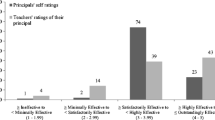Abstract
As managers of teachers, principals must cope with a variety of educational mistakes in their schools. These cumulative mistakes lead to a state of borderline competency in the teacher. From interviews with 30 elementary school principals in a large urban school system, interviews and observations of 19 borderline competent teachers, and review of principals' teacher evaluation records, five states of coping with teachers' educational mistakes emerged: (1) deployment-enlisting the teachers' colleagues to watch over him or her and report back to the principal on the teacher's behavior; (2) detente-bringing the troubled teacher within the society of peers and rallying forces to help solve his or her problems; (3) determination-deciding that the range of the teacher's deviations exceeds the boundaries of normative behavior and there is cause for dismissal; (4) evaluation-assigning an unsatisfactory efficiency rating with extensive documentation and recordkeeping for teachers who have been identified as borderline competent; and (5) formal dismissal-taking action to remove a teacher from the school.
Similar content being viewed by others
References
Barsky, H. (1975).The Political Style of an Urban Principal: A Case Study. Ph.D. dissertation, University of Pennsylvania.
Blau, P. (1964).Exchange and Power in Social Life. New York: Wiley.
Bucher, R., and Stelling, J.G. (1977).Becoming Professional. Beverly Hills, Calif.: Sage Publications.
Carnegie Report (1986). A system of pay, autonomy, career opportunities.Education Week, May 21, pp. 11–18.
Crowson, R.L., and Porter-Gehrie, C. (1980). The discretionary behavior of principals in large-city schools.Educational Administration Quarterly 16(1): 45–69.
Isherwood, G.B. (1973, March). The principal and his authority: An empirical study.High School Journal 56: 291–303.
Lipsky, M. (1976). Towards a theory of street-level bureaucracy. In W.D. Hawley et al. (Eds.),Theoretical Perspectives on Urban Politics. Englewood Cliffs, New Jersey: Prentice-Hall.
McPherson, R.B., Salley, C., and Baehr, M.E. (1975).A National Occupational Analysis of the School Principalship. Chicago: Industrial Relations Center, The University of Chicago.
Millman, M. (1977).The Unkindest Cut. New York: William Morrow.
Morris, V.C., Crowson, R.L., Hurwitz, E., Jr., and Porter-Gehrie, C. (1981). The urban principal: discretionary decision-making in a large educational organization. The University of Illinois.
Olesen, V.I., and Whittaker, E.W. (1968).The Silent Dialogue. San Francisco: Jossey-Bass.
Sarason, S.B. (1971).The Culture of the School and the Problem of Change. Boston: Allyn and Bacon.
Van Maanen, J. (1979).Organizational Careers: Some New Perspectives. New York: John Wiley and Sons.
Wolcott, H. (1973).The Man in the Principal's Office. New York: Holt, Rinehart and Winston.
Author information
Authors and Affiliations
Rights and permissions
About this article
Cite this article
Brieschke, P.A. The administrative role in teacher competency. Urban Rev 18, 237–251 (1986). https://doi.org/10.1007/BF01112131
Issue Date:
DOI: https://doi.org/10.1007/BF01112131




